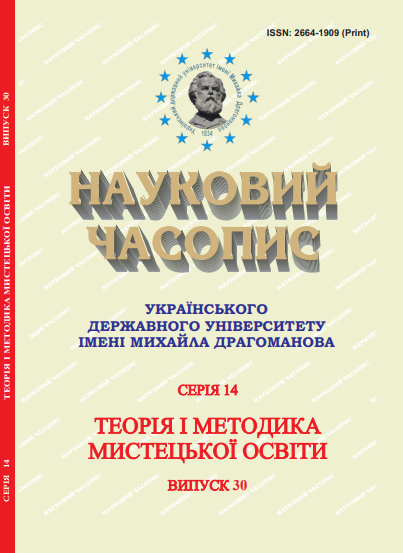Training of music teachers to future work with children with special educational needs
DOI:
https://doi.org/10.31392/UDU-nc.series14.2023.30.19Abstract
The article reveals the problem of preparing future music teachers to work with children with special learning needs. The main advantages and disadvantages of scientific works on this topic are indicated. It was stated that the field of introduction and implementation of productive technologies is possible in content and methodological support, as well as in the field of communicative and organizational. It is noted that future teachers of musical art do not have special training in working with this category of children, since their leading direction is working with children who develop normally.
Negative and aggravating factors are highlighted, since future teachers of musical art themselves may be traumatized by the war. This is reflected in the appearance of a psychological state of exhaustion from constant mental stress. Such an indicator should be considered as possible inappropriate reactions in the process of student learning. In such cases, it is necessary to immediately redirect training to positive aspects and stimulate health-saving resources. The leading characteristics on which the practical training of future music teachers in relation to children with special educational needs are focused are procedurality, prolongation, non-directiveness, depth in the real situation of the child-student, specificity of relationships between the participants in the interaction, reliance on the internal potential of the child’s development (creating a situation of success), individuality of approach to learning. The value and necessity of integrated work with a team of psychological and pedagogical support and the construction of an individual learning trajectory for a child with special educational needs is indicated. A package of characteristics is considered, which is given as the conclusion of highly specialized specialists of inclusive resource centers.
Recommendations are given regarding the conduct of various forms of musical activity with clarification of different areas of action, including improving communication skills, the ability to work independently, in pairs, collectively; work to improve motor skills and behavior; elaboration of emotional manifestations; development of sensory sensitivity development of musical abilities. A sequence of learning objectives is provided with an explanation of the reasons for conforming to this hierarchy. The priority belongs to ensuring the life and health of the child (children/people around them); improving social interaction skills; improvement of adaptive and everyday skills; formation of academic skills. The main methods and techniques of working in the musical field are given, indicating their influence and capabilities.
Downloads
Published
Issue
Section
License
Copyright (c) 2024 Scientific journal of M.Dragomanov Ukrainian State University. Series 14. Theory and Methodology of Arts Education

This work is licensed under a Creative Commons Attribution-NonCommercial-ShareAlike 4.0 International License.

